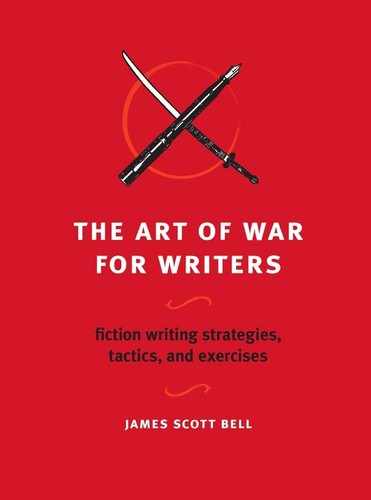
77
25
Write hard, write fast, and the
fi re of creation will be yours.
Not long ago, I got an e-mail from a young writer:
Did I tell you I signed up for NaNoWriMo [Nation-
al Novel Writing Month]? It has been a challenge,
but I’m making the word count. I have discovered
something interesting about this seat-of-the-pants
writer, this system works for me!!! I have a touch
of OCD so when I write a rough draft, I tend to
revise it into oblivion before the fi rst draft is done.
With NaNo I am forced to forge ahead with the
story. I love it.
Forging ahead with the story allows it to live and
breathe and take on new life.
So when you write that fi rst draft, my advice is: Write
hard, write fast.
Revise the previous day’s writing, then move ahead
with what’s in front of you.
That’s it. As fast as you comfortably can, until the
fi rst draft is done.
I contend that new writers would actually improve
their craft—and chances of getting published—if they
Z4273i_066-099.indd 77Z4273i_066-099.indd 77 9/24/09 11:20:53 AM9/24/09 11:20:53 AM

78
would write faster, especially at the beginning of their
learning curve. Here’s why.
First, you learn most about writing a full-length nov-
el by actually writing a full-length novel. It is much more
valuable to do this repeatedly than to hover too long over
one unfi nished (or unpolished) manuscript.
Second, you become a professional in the best sense
of the word (well, maybe second-best sense, the fi rst-best
being getting paid). A professional is someone who does
his job, every day, even if he doesn’t feel like it. A surgeon
can’t refuse to operate because he’s upset over the Laker
game last night. A criminal defense lawyer can’t ask for
a continuance so he can go to the beach and dream of
someday getting a client who is actually innocent.
And a professional writer can’t sit at the computer
playing Spider Solitaire, waiting for a visit from the
Muse. A pro is someone who writes, whether inspired or
not, and keeps on writing.
I’ve counseled many writers at conferences who have
come with a single manuscript yet haven’t got another
project going. I tell them, “That’s wonderful. You’ve writ-
ten a novel. That’s a great accomplishment. Now, get to
work on the next one. And as you’re writing that next one,
be developing an idea for the project after that.”
Publishers and agents invest in careers. They want to
know you can do this over and over again.
Some of the best novels of the past century were pro-
duced at a rapid clip by authors who found writing time
Z4273i_066-099.indd 78Z4273i_066-099.indd 78 9/24/09 11:20:53 AM9/24/09 11:20:53 AM

79
each day, and simply went at their task with singular
resolution:
•
William Faulkner wrote As I Lay Dying in six
weeks, writing from midnight to 4 A.M., then
sending it off to the publisher without chang-
ing a word. (You’re not Faulkner, by the way.)
•
Ernest Hemingway wrote what some consider
his best novel, The Sun Also Rises, also in six
weeks, part of it in Madrid, and the last of it in
Paris, in 1925.
•
In one stunning stretch (1953–1954) John D.
MacDonald produced seven novels of high
quality. Over the course of the decade, he wrote
many more superb books, including the classic
The End of the Night, which some mention in the
same breath as Truman Capote’s In Cold Blood.
Also Cry Hard, Cry Fast, which is the basis for the
title of this entry.
So prolific was MacDonald that he was
needled by a fellow writer who, over martinis,
sniffed that John should slow down, ignore “pa-
perback drivel,” and get to “a real novel.” Mac-
Donald sniffed back that in thirty days he could
write a novel that would be published in hard-
back, serialized in the magazines, selected by a
book club, and turned into a movie. The other
Z4273i_066-099.indd 79Z4273i_066-099.indd 79 9/24/09 11:20:54 AM9/24/09 11:20:54 AM

80
writer laughed and bet him $50 that he couldn’t
pull it off.
MacDonald went home and, in a month,
wrote The Executioners. It was published in hard-
back by Simon & Schuster, serialized in a maga-
zine, selected by a book club, and turned into
the movie Cape Fear. Twice.
•
Ray Bradbury famously wrote his classic Fahr-
enheit 451 in nine days on a rented typewriter. “I
had a newborn child at home,” he recalls, “and
the house was loud with her cries of exaltation
at being alive. I had no money for an office, and
while wandering around UCLA I heard typing
from the basement of Powell Library. I went to
investigate and found a room with twelve type-
writers that could be rented for ten cents a half
hour. So, exhilarated, I got a bag of dimes and
settled into the room, and in nine days I spent
$9.80 and wrote my story; in other words, it was
a dime novel.”
•
Jack London was anything but promising as a
young writer. He could hardly string sentences
together in a rudimentary fashion. About all he
had was desire. He shut himself up in a room
and wrote. Daily. Sometimes eighteen hours a
day. He sent stories off that got returned. He
filled up a trunk with rejections. But all the
Z4273i_066-099.indd 80Z4273i_066-099.indd 80 9/24/09 11:20:54 AM9/24/09 11:20:54 AM

81
time he was learning, learning. When he died at
the age of forty, he was one of the most prolific
and successful writers of all time.
•
John O’Hara wrote fast, and well, turning out
books, stories and plays over the course of his
long career.
•
Charles Dickens wrote fast. He had to. He had
ten children. And he wrote many of his novels
in installments for literary magazines. He had
to keep the chapters coming.
•
Stephen King says he used to write 1,500 words
a day, every day, except his birthday and the 4th
of July. A prodigious output resulting in the
National Book Award Medal of Distinguished
Contribution to American Letters.
One could go on, but the lesson is clear. Writing
“genius,” like any other kind, is 99 percent perspiration.
These authors all worked extremely hard early in their
careers to learn their craft. By writing relatively fast, they
forced themselves to learn. Their books were not the
product of small bits of inspiration, but rather steady,
dedicated, intense work, day after day.
I do have writer friends who believe that writing
slowly, carefully, polishing as they go, is the best way to
produce quality work. That’s fi ne for them. It may even
be fi ne for you.
Z4273i_066-099.indd 81Z4273i_066-099.indd 81 9/24/09 11:20:54 AM9/24/09 11:20:54 AM
..................Content has been hidden....................
You can't read the all page of ebook, please click here login for view all page.
